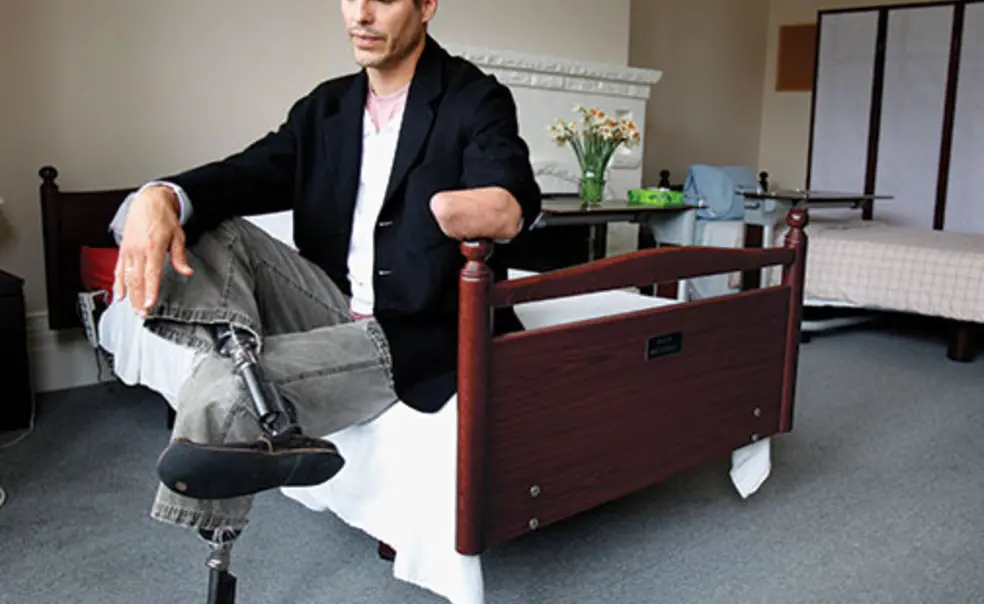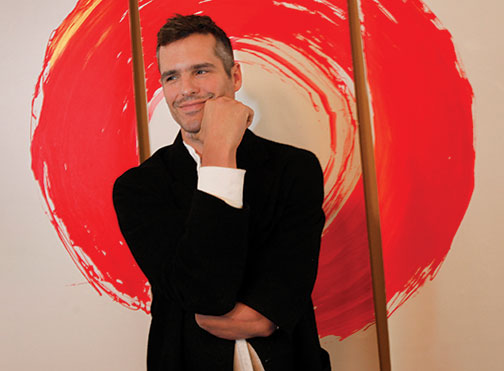BJ Miller ’93: Wounded Healer
After a horrific accident, he built a life helping others who are nearing death
Twenty-three years ago, in the wee hours of a November night during his sophomore year at Princeton, BJ Miller ’93 was horsing around with friends after leaving a party. He climbed on top of the parked Dinky shuttle train, and 11,000 volts arced from the power line through the watch on his left hand, running through his body. He was severely burned and nearly died.
The accident resulted in the loss of his legs below the knee and his left forearm. Today Miller is a palliative-care doctor, working to ease patients’ physical and emotional suffering at their most vulnerable point in life — something for which he’s eminently qualified. He walks, hikes, and bikes on carbon-fiber prosthetics that look like supple metallic bones.
Miller does not remember much from that night: a boom and blinding light that occasionally visit him in the moments before he goes to sleep, and the transport helicopter that carried his 6-foot-5-inch frame. “What I mostly remember is waking up about a week later, feeling the way you do when coming out of a bad dream. But when I jumped out of the hospital bed, ripping all the tubes out of me, trying to walk, and falling in a heap on the floor, I realized that the nightmare had actually been true,” he recalls.
Miller says he has no regrets — not even for the injury. “Too much good stuff has come out of it,” he says. “I was not headed toward a career in medicine before the accident, and I don’t think I’d be as good a palliative-care physician if I hadn’t had that experience. Every day I feel I have a head start when I meet patients and their families, because they know I’ve been in that bed. That can take us to a much more trusting place more quickly.”
He has cared for thousands of people as they lived out their last days. “Mortality is an incredible unifying force, because 100 percent of us die,” reflects Miller, the executive director of the Zen Hospice Project, a residential facility for dying patients in San Francisco. “It unites us across cultures, wealth, and age.”
Zen Hospice is a natural fit for Miller. The organization, based loosely on Buddhist principles, offers care that helps patients embrace the spiritual side of death. For the past two years, he has overseen patient care in the facility’s six beds; all of the patients are believed to have less than six months to live. In addition to offering comfort at bedsides and prescribing symptom management and pain medications, he fundraises for the organization and has served on a national committee to help raise the profile of the field of palliative care.
Working 70 to 80 hours per week, Miller also sees patients at the University of California, San Francisco Helen Diller Family Comprehensive Cancer Center, where he has taught and practiced for seven years. He occasionally makes house visits to dying people.
Left with a deep understanding of suffering and chronic pain after his accident, Miller has embraced a life steeped in humility and the big questions.
After several months of recovery following the accident, Miller was left with what he calls “a new body.” “The gift was that it got me out of the habit of thinking about the future and comparing myself to others. It rammed me into the present moment,” he says. “I’m actually grateful for that. I found a new confidence.”
Having grown up with a mother who used braces, crutches, and eventually a wheelchair because of childhood polio, Miller knew firsthand that having a “disability” did not have to be an impediment to a normal life. “That helped me circumvent the self-loathing that can happen in situations like this,” he says. “I decided not to try to ‘overcome’ my situation, but rather to play with it and be fed by it.”
“BJ was the same person after the accident as he was before,” says Tom Pinckney ’93, a close friend who has stayed connected with Miller. “He just had a new set of challenges, which he dealt with incredibly effectively.”
Support from family and friends sustained Miller through a difficult period at Princeton when he sued the University, New Jersey Transit (which operates the Dinky), and other parties. He reached a settlement for a total of more than $5 million, to cover medical expenses for the rest of his life, and new safety measures and warning signs were installed at the station.
After the injury, Miller no longer could row for the crew and changed his major from Chinese and Asian studies to art history, because he found art took him “to another plane and onto questions of human existence.” Art was therapeutic; it helped him gain perspective as he refashioned himself. But when it came time to graduate, he decided to pursue a career in medicine, earning a medical degree from the University of California, San Francisco. “UCSF took a chance on me, seeing that my time as a patient had value,” says Miller. Rehabilitation medicine seemed like a natural course, but a rotation in the field turned him off. “I didn’t like coming in with a big smile and being the poster boy for people who were trying to recover basic bodily functions,” he says. “Something felt not right about it.”
The suicide of his sister during that period again forced Miller to confront issues of suffering and death in an acute way. When he took an elective at the Medical College of Wisconsin in palliative care, it was “instant love.” “You’re encouraged to use your suffering as a motivator and teacher. That was the right fit,” says Miller.
Life isn’t all about hospice work for Miller. He owns a 10-acre farm in Boulder, Utah, where hay and alfalfa are grown for nearby ranches and horse farms, as well as apples, pears, nectarines, plums, grapes, and raspberries. “Getting outside in Mother Nature is extremely important to me,” says Miller, who also enjoys mountain biking and “road trips to nowhere.” In 2000, he and his friend Justin Burke co-founded a loose-leaf tea company named Tribute Tea, in which Miller lightly keeps a hand.
Miller’s approach to medicine is to “act from compassion and awareness,” he says. Diane Mailey, director of strategic development at Zen, says, “BJ is an extraordinary caregiver and person. He never puts himself above anyone, but relates to patients deeply, person to person.”
“That’s the most potent medicine, just coming from a place of love and kindness,” Miller says. “Medicine traditionally thrives on a hierarchy that I’m happily flattening. I equate the doctor and patient because I am a patient. Sometimes there’s nothing fixable and nothing left to do except bear witness and lend a shoulder, even if it’s handing someone a tissue and not running away when things get rough.”












3 Responses
Stephen Heffron
6 Years AgoThankful for the Inspiration
My phone buzzed and up came the article on this wonderful inspiring man. I’m so sorry about what happened to you, but this overwhelming feeling came over me to read more. I have from time to time thought my life is wasted and have thrown several pitty parties through the years. I want to thank you for your story and my new-found attitude. You are just an amazingly beautiful person.
I’m going to rethink my approach to whatever time I have left and do what I can to remember that there are some incredible and good people in the world. It’s strange that I looked at the phone when I did, but I did and am thankful for that and for the inspiration you have given me .
All the best to you and thanks for sharing.
Paula Hundley
9 Years AgoI don't know if the thought of my own passing...
I don't know if the thought of my own passing and end of life terrifies me, so much as the possibility of losing one of my daughters or Grandsons. Always being very emotional ( I am choking back tears at an advertisement suggesting a man's dog dying :) ) so I fear the absolutely crippling emotion, becoming suicidal at this kind of loss. I am equally afraid of even having this fear, as I feel we force ourselves to have to face what we constantly fear. So how do I change this sort of disablity? Perhaps someone like Mr. Miller will write a book that I can connect and see my attachments in a more serene way.
Brungraber Ruttenberg ’76
10 Years AgoCare in the final days
I was deeply moved by the article about BJ Miller ’93 and his work at the Zen Hospice Project (Princetonians, Feb. 5). I remember hearing about his accident after I left Princeton and am delighted to know that he not only survived but has flourished, despite his injuries.
I, too, practice palliative and hospice medicine, in my case after a career in anesthesiology. Palliative and hospice medicine was but a twinkle in a few visionaries’ eyes when I graduated from medical school in 1983.
Although I started out enjoying anesthesiology, over time I began to feel like an accomplice to the mere shuttling of terminally ill patients back and forth from operating room to ICU until they died. The price was enormous suffering for them and their loved ones, tremendous expense to society, and a less tangible but profound toll on the morale of staff providing what they knew to be futile care.
While my years of experience with techniques and medications for the relief of pain certainly come in handy in palliative and hospice care, Dr. Miller is right in noting that simply bearing witness to one another’s mortality is a huge part of our job. It is a practice at which our culture has become quite out of practice.